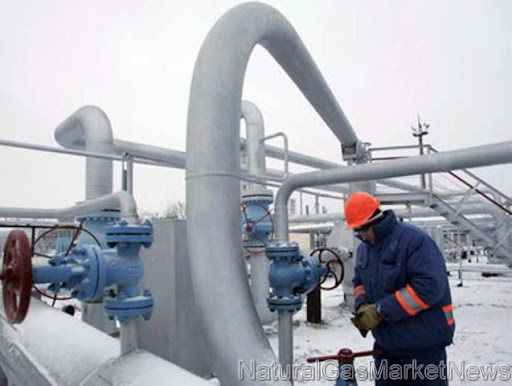 (Reuters) - The U.S. natural gas market's rally last week, its biggest this year, may have less to do with an anticipated Japanese import boom than with fears about short-term safety measures in the U.S. nuclear sector.
(Reuters) - The U.S. natural gas market's rally last week, its biggest this year, may have less to do with an anticipated Japanese import boom than with fears about short-term safety measures in the U.S. nuclear sector.
The U.S. government has so far refrained from the kind of knee-jerk reaction to Japan's nuclear crisis that prompted Germany to shut down a quarter of its oldest plants, but U.S. traders are increasingly anxious that more rigorous inspections or other measures could yet crimp nuclear power use.
Slicing into nuclear power would create a vacuum for other fuels to replace the lost generation -- likely natural gas as the nation has potentially more than a hundred years of supply trapped in between layers of underground rock.
If operators were to shut all the General Electric Co (GE.N) Mark 1 boiling water reactors -- the type damaged in the Japanese quake and tsunami -- operating in the United States for one month it would reduce overall nuclear power generation by 20 percent and potentially boost gas demand by 3.6 billion cubic feet per day -- more than 5 percent of current demand.
A worst-case scenario involving the Nuclear Regulatory Commission ordering all U.S. reactors to shut is not expected, but some market watchers are already starting to factor in longer stretches of outages for bolt-specific checks of plants that provide about a fifth of the country's electricity.
"We could imagine the NRC requesting a timeout over coming months for each plant to come offline and take a full assessment of safety equipment performance," said analysts at Credit Suisse in a report issued last week.
Prices for U.S. natural gas spiked sharply between the day the earthquake occurred on March 11 and Thursday, with June and July contracts gaining around 7 percent each and benchmark futures climbing over the $4-per-million-British-thermal-units level for the first time in two weeks, as public concern began to mount on how U.S. nuclear capacity might be affected.
Even so, there is little cause for a direct impact on the U.S. market as a result of the likely surge in liquefied natural gas (LNG) imports by Japan, which needs the fuel to compensate for its shut nuclear plants.
U.S. LNG imports have already shrunk to near zero as a result of the domestic shale gas boom that's depressed prices. Proposed terminals to export LNG from the United States are years away.
"Bullish punts are...mostly based on market position and technical landscape, but also emerging concerns on whispers of upcoming "spot checks"/inspections of domestic nukes nationwide," Michael Guido, director of energy hedge fund sales for Macquarie Bank in New York, told the Reuters North American Power & Gas Forum, an online forum for power and gas traders.
GERMANY JUMPS, U.S. SUPPORTS
Amid a predictable knee-jerk reaction to talk tough on tightening regulations for the nuclear industry around the world, only German Chancellor Angela Merkel took the additional step of shutting seven of Germany's older nuclear power plants following the disaster in Japan.
President Barack Obama said on Thursday he had requested a comprehensive review of U.S. nuclear facilities, maintaining his support for atomic energy.
U.S. regulators still have an ear toward Japan and international nuclear regulatory groups, to discern exactly what went wrong before they slap a set of new instructions onto local plant operators.
The NRC will hold a meeting on Monday "to examine the staff's ongoing response to events in Japan," said NRC spokesman Scott Burnell, declining any further comment on possible additional safety measures the NRC could take.
Following the Three Mile Island disaster more than 30 years ago, U.S. officials tightened physical plant design standards and required plants to build their own training simulator, but they did not order any existing plants to close.
There seems even less reason to do so this time around: The root cause of the accident in Japan was a tsunami that caused power outages and back-up generators to fail; as a result, Tepco was unable to cool down fuel in the reactors, which shut as planned when the massive earthquake struck.
WORST CASE SCENARIO
The NRC governs the specifics of refueling and maintaining a nuclear power plant but does not impose time requirements on when an outage needs to occur.
Generally plants are taken offline to refuel every 12, 18 or 24 months in spring and fall when demand is slack for several weeks at a time.
The wild card would be whether findings from any inspections would lead the U.S. to scrap that type of GE reactor entirely and spur a redo.
"It's reasonable to assume there's going to be inspections which may involve some downtime and it's economic to combine them with refueling outages if it's not urgent," said Jone-Lin Wang, managing director of global power in Washington, D.C., for consultancy IHS-CERA. "If you're in imminent danger you're not going to wait until your next refueling."
The GE reactor that suffered damages in Japan operates in 23 power plants in the U.S. representing some 20 percent of U.S. nuclear power. Right now, of that total, about 4,000 MW are offline for seasonal maintenance.
If the balance were to go offline and were replaced only with gas-fired combined cycle generation, gas demand would increase by 2.9 bcfd.
If all that capacity were to go offline, it would mean a 3.6 bcfd increase in natural gas demand, or 5.6 percent increase over current U.S. gas demand over the long term, according to calculations by Bentek Energy, an arm of Platts.
Still, with the amount of natural gas producers are churning out, it will likely take more than a full-scale nuclear plant panic to keep prices elevated for long.
"I think you'd have this unknown around the duration and that would support gas prices," said Dave Pursell, a natural gas analyst with Tudor Pickering Holt & Co. in Houston. "That would be enough to take gas to the mid-$4s to high $4s. It would clearly be bullish for gas."
(Source: http://www.reuters.com/article/2011/03/21/us-natgas-japan-idUSTRE72K22220110321?pageNumber=2)


























0 comments